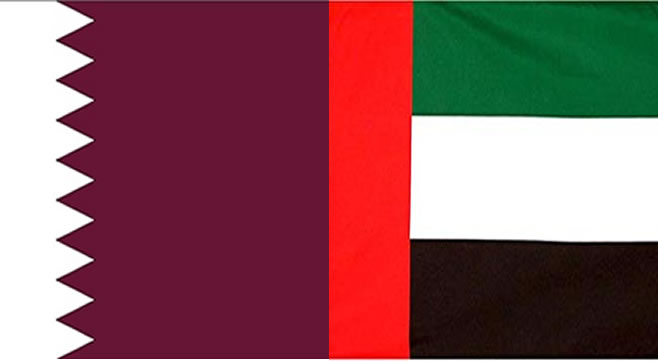by Mohamed Elmi
Monday, September 30, 2019

On July 22, 2019, a report by the New York Times published a stunning new revelation of two rival Gulf states trading guns, cash, and profit in Puntland. The report states that United Arab Emirates and Qatar each supply "weapons and military training to favored factions...competing for contracts to manage ports or exploit natural resources."[1]. The report warns of potential destabilization of Northern Somalia as these two rival Gulf states employ similar tactics of the Cold War politics, largely viewing Somalia from the narrow lens of a client state.
Qatar did not dismiss the veracity of the secret recording that implicates a Qatari official in the alleged bombing of the Bossaso port and the assassination of the Emirati employee, rather it frames the recording as a private communication that does not reflect the official position of Qatar’s foreign policy toward Somalia. Qatar’s actions only served to embolden UAE’s dubious tactics to achieve its short-term hegemonic position at the expense of the fragile peace in Northern Somalia and by pitting one community against another.
Under the current model of federalism, semi-autonomous Somali regions have emerged to establish some formal ties with foreign governments without the knowledge of the Somali Federal Government. In juridical terms, this is a clear violation of the sovereignty and territorial integrity of Somalia. U.A.E provides systematic aid in the form of weapons and military training to a paramilitary force in Qaw, a small coastal town. UAE contracted with the founder of the now defunct Blackwater, Mr. Prince, using South African mercenaries. The paramilitary force was initially trained as coast guard to fight pirates and was posted near the resource rich Dalan and Majihan area of Western Bari. It receives millions of USD from UAE to conduct various clandestine security operations under the pretext of fighting piracy; however, active piracy is concentrated in the Nogal and parts Mudug regions and have since either subsided or largely ceased following a concerted international response to protect the region’s vital shipping lanes.
After meeting with the director of Abu Dhabi Chamber of Commerce and Industry (ADCCI), Mr. Deni, Puntland’s president, declared to defeat the militant group in Galgala mountains in order to “attract investors”, according to Bloomberg. Details of the meeting are sparse but the director ADCCI tweeted that they discussed investment opportunities. UAE is aiming to achieve its hegemonic position at the expense of peace. It wants Somalia to (a) reconsider its position of neutrality in its fight against the Hauthis of Yemen, (b) to contain the spread of political Islam by building military bases, and (c) to safeguard its commercial interest. Northern Somalia’s relatively stable political environment is hanging on the balance.
A policy paper by a group of intelligentsia and former politicians from Puntland have even called for the abrogation of the Federal charter or in official terms the provisional federal constitution in exchange of confederation—a system that subordinates or parallels the powers of the Federal Government to the States. Confederation is a union of states. The central government derives its legitimate authority from the States and has no direct authority over the people. By contrast, in a system of federation as that of the United States, the federal government is a system of union—both states and the federal government exercise and receive direct authority over the people[2]. Others argue that a government that reaches the people is more important, irrespective of which system we Somalis adopt to govern ourselves. A system of confederation, however, is a return back to the state of nature. Prior to the onset of collective Somali resistance against imperial powers, the concept of nation-state governed by a social contract was virtually nonexistent. Each Somali clan was sovereign and had maintained a defined territory, defined population, and defined history to run its own affairs independent of external authority.
The crisis in Jubaland has only exacerbated the current political turmoil and security challenges the country is in. I believe the Federal Government attempted to create a balanced and less corrupt electoral process, but that plan failed due to the incumbent’s drive to successfully run for another term in office and at the insistence of other communities to secure their fundamental rights under a free and democratic process.
We ask outside governments to respect Somalia’s sovereignty; we stress our need for international aid (humanitarian or otherwise) cannot be substituted for the nation’s sovereignty and territorial integrity; any agreement, therefore, between a foreign entity and Somali region should not be allowed to bypass constitutionally mandated government agencies of the Federal Republic of Somalia, in line with the president’s proclamation. The sovereignty of the country is on the line and we Somalis are duty bound to defend Somalia from domestic and foreign enemies.
Mohamed Elmi
[email protected]
References
Bergman, Ronen., Kirkpatrick, David. (2019, July 22). With Guns, Cash and Terrorism, Gulf States Vie for Power in Somalia. The New York Times. Retrieved from https://www.nytimes.com/2019/07/22/world/africa/somalia-qatar-uae.html
Burns, J. M., & Peltason, W. j. (1972). Government by the people . New Jersey: Prentice-Hall, Inc.
Mazzeti, Mark., Hager, Emily B. (2011, May 14). Secret Desert Force Set Up by Blackwater's Founder. The New York Times.
[1] Bergman, Ronen., Kirkpatrick, David. (2019, July 22). With Guns, Cash and Terrorism, Gulf States Vie for Power
in Somalia. The New York Times. Retrieved from https://www.nytimes.com/2019/07/22/world/africa/somalia-qatar-uae.html
[2] Burns, J. M., & Peltason, W. j. (1972). Government by the people . New Jersey: Prentice-Hall, Inc. .